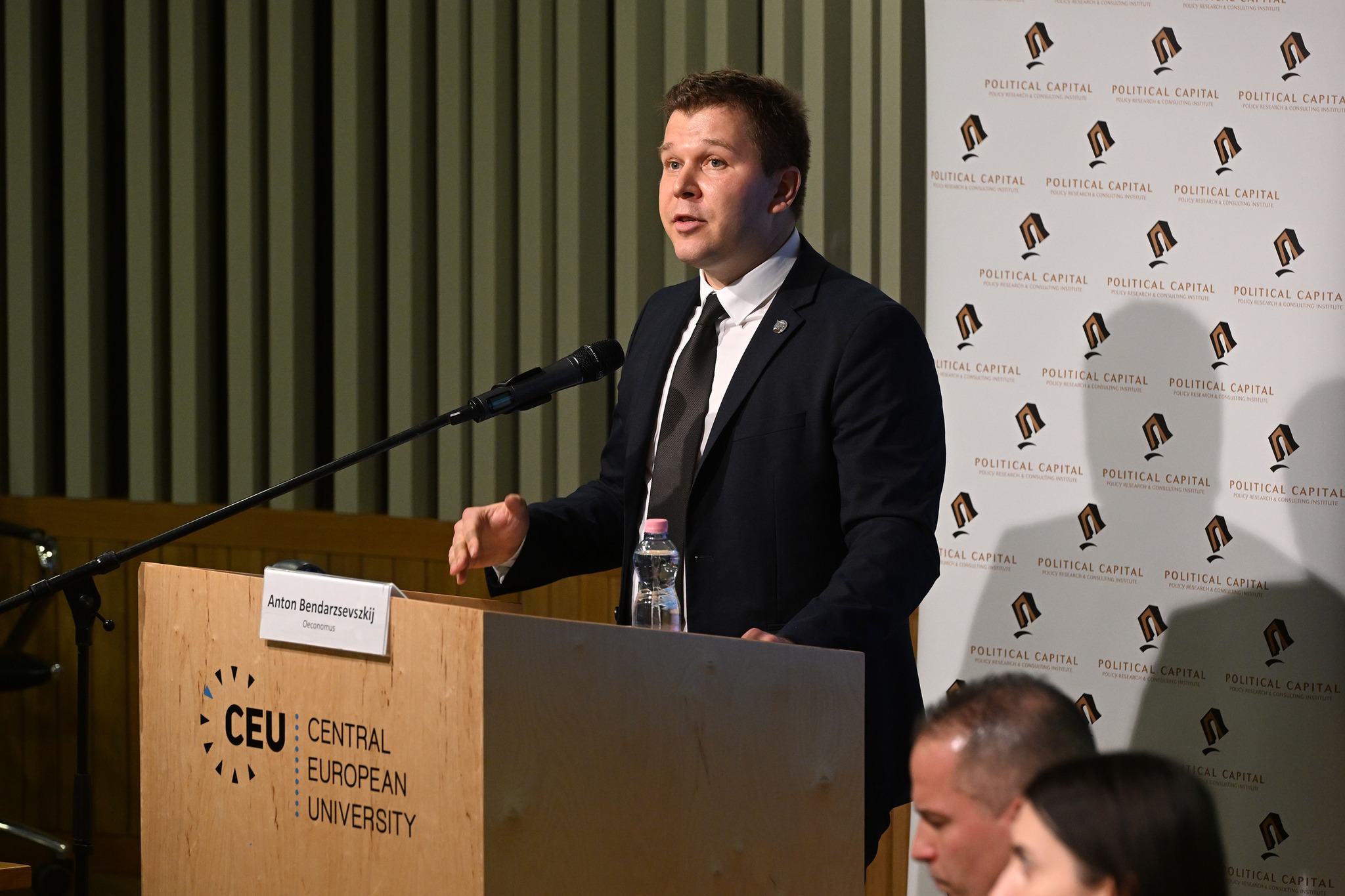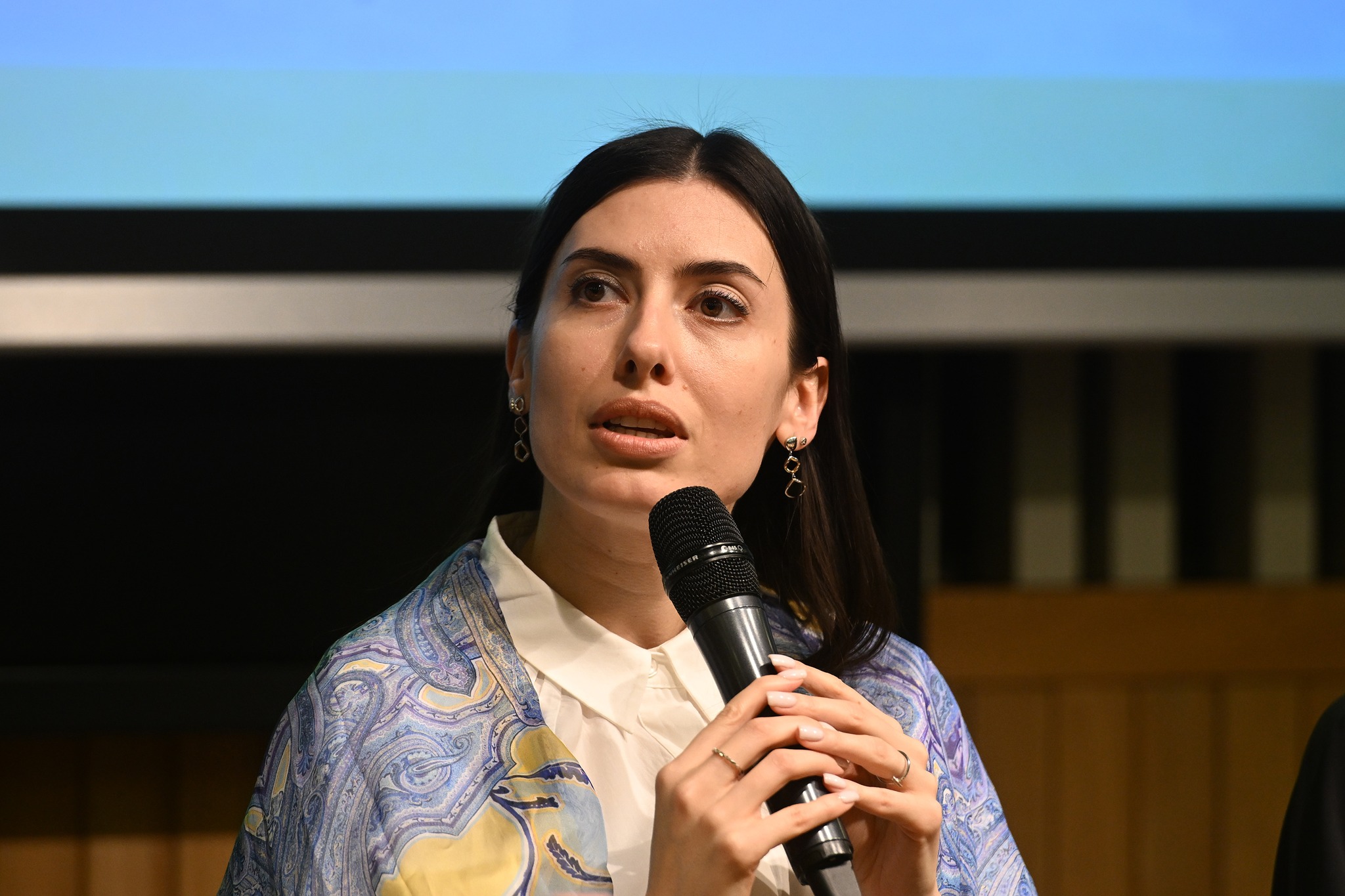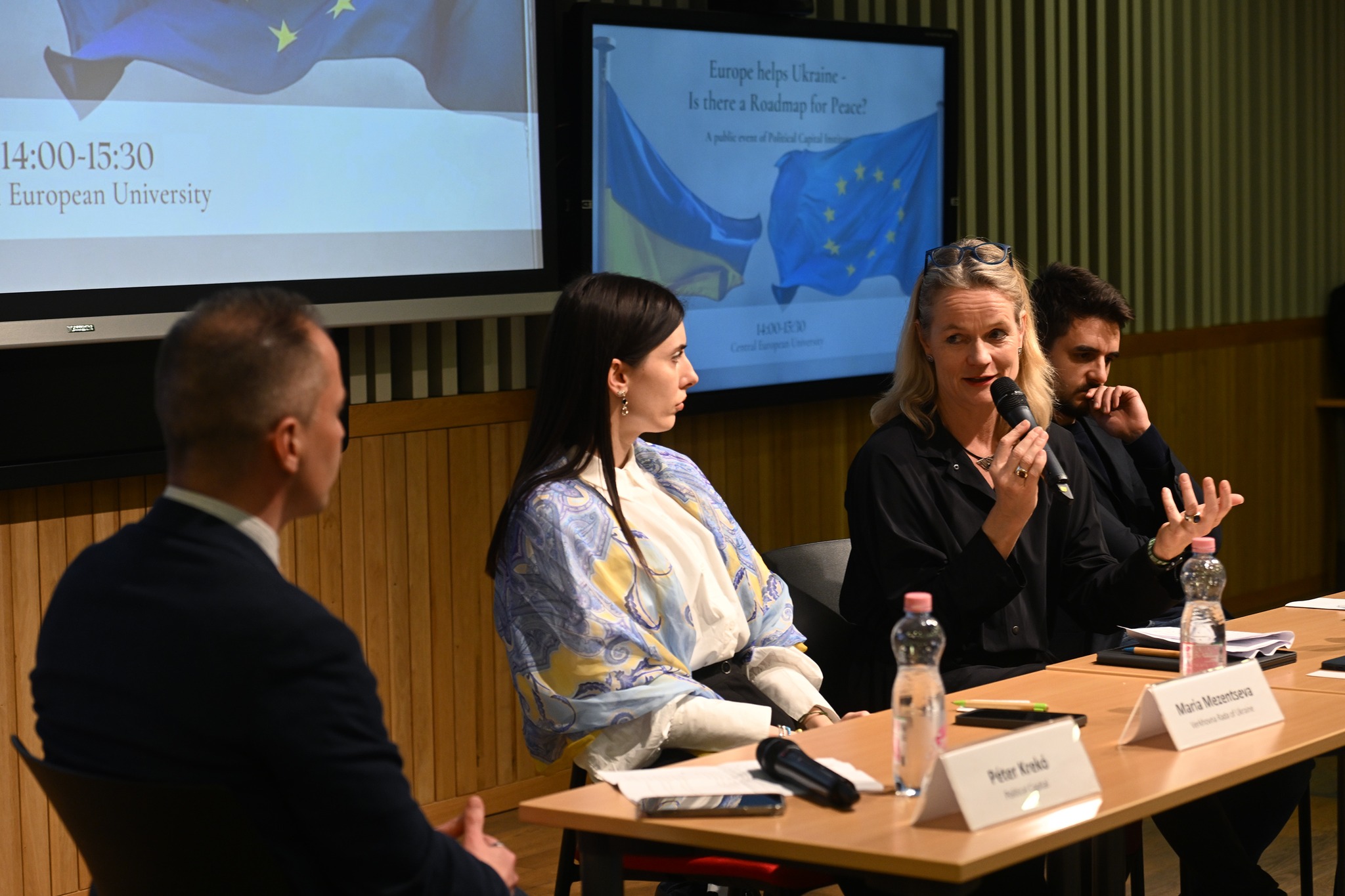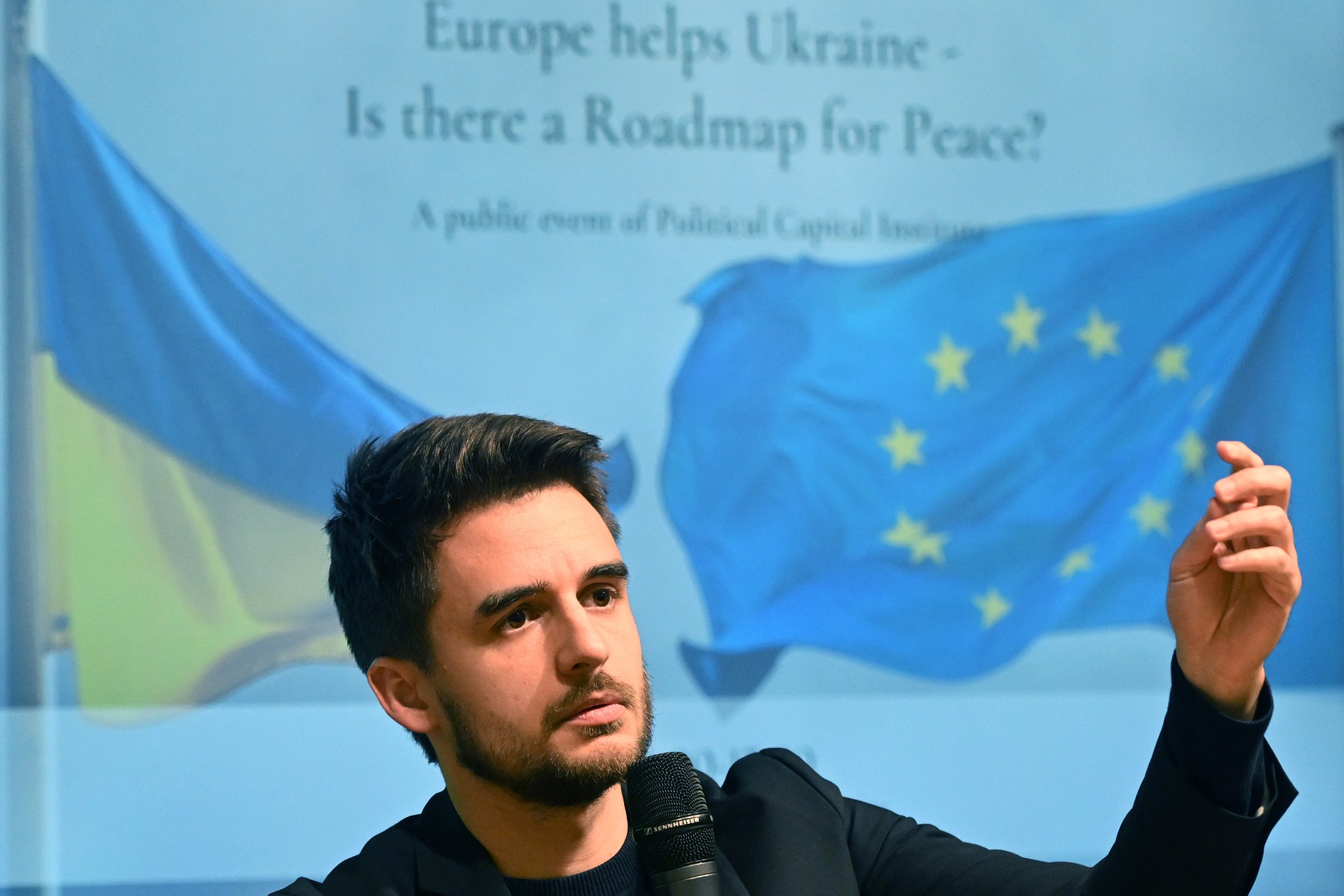The Future of Ukraine - Do We Know the Road to Peace?
Without the restoration of Ukraine's territorial integrity, lasting peace is impossible - this was one of the points made by Maria Mezentseva, Member of the Ukrainian Parliament, at an event organised by Political Capital (PC) on 27 March, where the potential peace scenarios of the Russian-Ukrainian war were discussed with Anton Bendarjevskiy, Professional Director of Oeconomus, Viola von Cramon-Taubadel, Member of the European Parlament of the Greens and Márton Tompos, MEP of Momentum. The discussion was moderated by Péter Krekó, director of PC.
First, Oeconomus Professional Director and specialist on Russia, Ukraine and Belarus, Anton Bendarjevskiy summarized the potential peace narratives. The restoration of the 1991 internationally recognized borders, including the reunification of Crimea and Donbas, was the Ukrainians' main objective. To stop the start of another war, they also urge that Russia's political system be reformed.

Bendarjevskiy described the Russian narrative as a kind of ultimatum to Ukraine, which expects Ukraine to immediately end the war and recognise the regions annexed by Russia (Crimea, Donbas, Kherson, Zaporizhzhya) – in other words, an unconditional acceptance of Russia's victory.
The US narrative aims at restoring the post-WWII international world order and security system based on international law and the sovereignty of states. Several of its top figures also talk about the strategic defeat of Russia.
Similar to the Ukrainian and American approaches, China's peace plan calls for adherence to international law as well as the protection of Ukraine's sovereignty and territorial integrity. At the same time China argues that for peace to last, it needs to take into account Russia’s security worries, i.e. halting NATO-expansion, and ensuring Ukraine's neutrality..
According to Bendarjevskiy, the strategic defeat of Russia is the wrong course since as it would lead the country into a period very similar to the end of the Cold War, which is the root of its problems. While Ukraine thinks time is on its side because it is gaining more and more support while Russia's might is waning, Moscow thinks time is on its side because the West is weak and won't support Ukraine for very long. The Ukrainians' perception, in Bendarjevskiy's opinion, is more correct. He also points out that the current Russian leaders are in their seventies, a generational shift is unavoidable in the near future, and if anything, it might even result in a shift in Russian geopolitics.
Maria Mezentseva, a member of the Verkhovna Rada (the Ukrainian parliament) and the Parliamentary Assembly of the Council of Europe, compares Vladimir Putin to Slobodan Milosevic and believes Volodymyr Zelensky will lead Ukraine to victory. She anticipates that the International Criminal Court will issue another arrest warrant for Putin for mass bombing of civilian and critical infrastructure targets. She applauded Hungary for agreeing to two aspects of Zelensky's plan: accountability and humanitarian relief. She recalled that Ukraine has tried to make peace on three occasions: during the 1994 Budapest Memorandum, the 2014-2015 Minsk agreements and in March 2022. However, Russian war crimes have made this impossible.

Mezentseva also pointed out that, contrary to what the Chinese are suggesting, a ceasefire cannot be accomplished by just promising a Russian pullout at a later time. She emphasized that without a complete withdrawal of Russian forces, there cannot be a permanent peace. She is satisfied with the Chinese President's visit to Moscow, , as she feels that the Russians have received essentially nothing from China.
She also talked favorably of working together with the Hungarians in the Council of Europe: Hungary backed the move to kick Russia out of the organization, and she expects them to back the resolution denouncing Russia for the mass deportation of children, which is she even declared a genocide. She believes there may still be disagreements on national minority rights, though. The rights of national minorities were listed as one of Ukraine's top concerns in its commitments to the European Commission at the advice of Hungarian government representatives. She acknowledged that the situation of Hungarian-language education may be worth reviewing, but she pointed out that the Ukrainian state is now experiencing legitimate funding issues. She asserted that the Ukrainian parliament and government share a commitment to upholding the rights of national minorities and that they are now awaiting the Venice Commission's and the European Commission's opinions on the subject.
Mezentseva claims that 1.7 billion people are indirectly impacted by Russian aggression, citing UN figures; this obviously includes those who experience growing energy and food costs or grain shortages. Although the conflict is being waged on Ukrainian soil, she claims that the entire European peace project is in jeopardy and that only Western solidarity can rescue it because if Ukraine were to fall, Russian troops would advance all the way to the western coastlines of Europe.
The war did not begin on February 24, 2022, according to Viola von Cramon-Taubadel, a member of the Greens in the European Parliament, but rather in February 2014, when Crimea was annexed. At the time, everyone was excited about the Minsk agreements and the potential impact that Europe may have on the developments in Ukraine. She claimed that Russia has since violated every commitment of the agreements. Russia has made it plain through its war crimes that for a genuine peace to exist, Russian soldiers must be removed from Ukrainian territoriy, war criminals must be brought to justice, and security guarantees must be put in place. She believes that Ukraine's supporters are still in the majority, but she is concerned that an isolationist candidate (she meant Donald Trump, for example) who would reduce support for Ukraine could win the US elections in 2024. In those circumstances, the EU would need to take a more active role.

The member of the European Parliament also referred to the highly effective Russian disinformation, which it employs successfully to heighten social tensions or merely to sow confusion, as in the Western Balkans, a region she said the EU should pay more attention to due in part to the ease with which ethnic conflicts can be sparked there. Outside of Europe, disinformation must also be fought, particularly in nations where Russian influence is considerable (e.g. Africa).
In the view of Márton Tompos, a Momentum MP in the Hungarian Parliament, solidarity is present in people. He cites the first phase of the refugee crisis in 2015 or the months following the beginning of the Russian aggression last year as examples of this. The Tompos criticized the Hungarian government for its pro-Russian rhetoric and vetoes while expressing solidarity with Ukrainians who are fighting for their lives. He views the negotiation and resolution of the treatment of the Hungarian minority in Ukraine as being of utmost importance, but he believes that this issue can only be resolved peacefully through gestures made by both parties and during a time of peace, as it is not feasible during a time of war. He thinks that the government is utilizing what is unquestionably an issue as a political tool, not even trying to find a meaningful solution.

On the issueof reconstruction, Tompos stated that Hungary must participate, both because it is required by economic and diplomatic logic, as well as because we must assist the Hungarians of Transcarpathia in resuming their peaceful lives.
You may access the complete debate here (in English):

